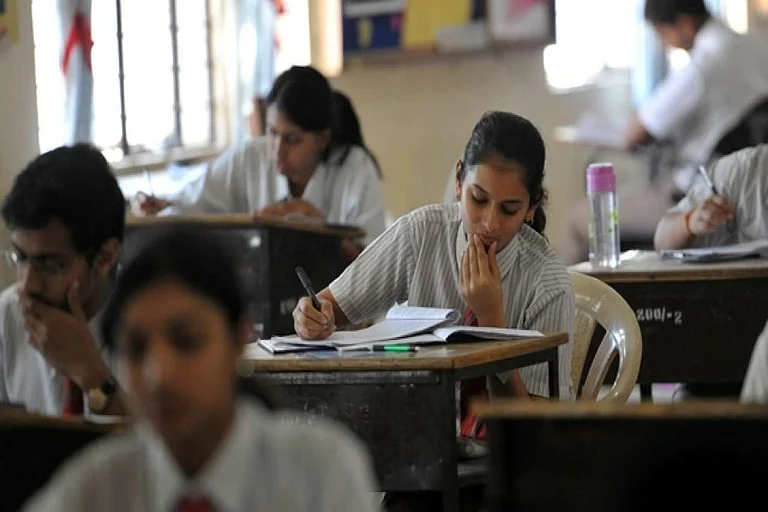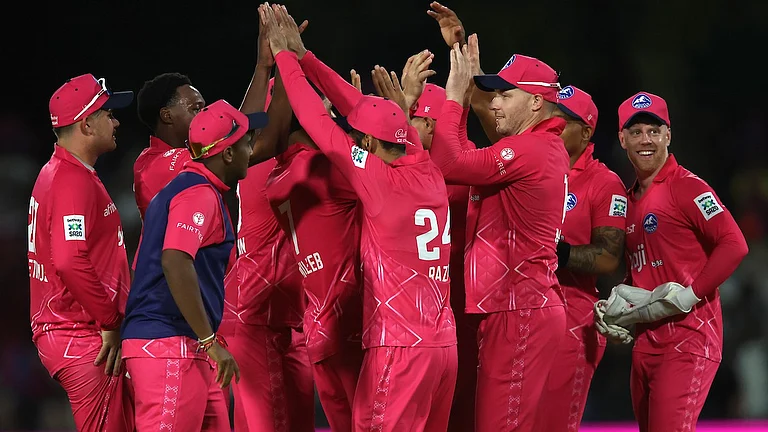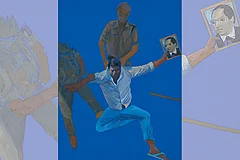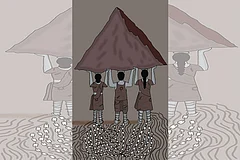When Matin Bhosle insists that the Samruddhi Mahamarg route is the best way to reach his place, the irony is unmissable.
It was during the construction of the Hindu Hrudaysamrat Balasaheb Thackeray Maharashtra Samruddhi Mahamarg, which connects the districts of Vidarbha to Mumbai, that a bulldozer arrived at Matin’s Prashanchinnha Pathshala in June 2019. It demolished the library, ten classrooms, staff quarters, and a 65ft deep well, which had taken Matin ten years to build on 10 acres of government land he had encroached.
It’s been five years since that fateful day and he is still picking up pieces of what escaped demolition. The school, located in his village Mangrur Chavala, 35 kms from Amravati district in Maharashtra, is reduced to a single-storey building. The classrooms turn into dormitories in the evening where the children sleep. The verandah in front of the classrooms/dormitories serves as the dining hall.
In 2012, Matin Bhosle quit his job as a teacher in a Zilla Parishad school, to set up one of his own, for the Phanse Pardi community to which he belongs. His caste, which is at the 38th number in the list of scheduled tribes, suffers from a stigma that has stuck since the pre-independence era.
“The Britishers used our community to steal grains and other equipment from moving trains, to sabotage the freedom movement. When the instances of such robberies would increase, they would round up members of our community and put them in jail,” explains Matin.
As a result, the Phanse Pardis tribe are not welcome inside villages. They live in makeshift homes outside the village periphery and move frequently. “To survive, they hunt, steal from farms, work as scavengers or beg,” he says, not denying that stealing and hunting are traits associated with his tribe.

Matin’s father spent some time in jail. There, he decided his children would have a different life. “Another inmate gave him this wisdom that, unless he educated his children his family’s plight will not improve,” says Matin who completed his education with the help of a teacher who got him books, a bag and an uniform.
Education ensured him a job reserved for the ST category in a school in Melghat. However, the idea that the children of his community continued to suffer haunted Matin. “So many children are begging, scavenging or stealing and getting beaten up by cops,” he says.
Matin travelled across India to identify Phanse Pardi children. “Phanse Pardi tribe are natives of Maharashtra. I could identify the children through their language,” he says.
He went across India to Mumbai, Kolkata, Chennai, Hyderabad, to Nagpur, Amravati andYavatmal. He rescued 148 kids many of whom were living in railway stations, traffic signals and under bridges. They were orphans or had parents in jail. He set up a school on a three-acre land belonging to his uncle, took the help of a medical officer to determine the age of each child and admitted them in the requisite class.
Once he had the students and a school, he raised funds. The children need a school exclusively for them, he insists.
“The stigma of being thieves makes Phanse Pardi social pariahs. And, our dialect is different from Marathi, so it’s difficult for our children to understand what is being taught,” Matin says.
Not everyone sympathised with his efforts. In 2013 he was jailed on the charge of making children beg. His wife Seema was full term pregnant. “I went to the police station and told them that they should either free my husband or put me also in jail,” says Seema. The police reciprocated and put her behind bars on a charge of being a nuisance. Their fourth child, a boy aptly named Sangharsh, was born inside a jail cell.
“Initially I was upset that Matin quit a job and a secure income. But, I understand that to uplift our tribe from this perpetual state of poverty, education is a must,” she says.
Matin was released on Aug 15 of that year from the solitary confinement in which he was kept. He returned to his village and school with a new determination. “I could raise Rs. 1.5 crore from various sources with which I built the library and classrooms on government land that I encroached for this purpose,” he says. A bulldozer destroyed all of it and left him in a daze and a constant state of struggle. “I am dealing with four court cases lodged against me for trying to interfere with government work and a constant lack of funds to run the school,” he says.
The situation is bad, says Matin. “A minimum of three and a half lakhs is required monthly for groceries and vegetables. I depend on donations, which fluctuate between a lakh and a half to sometimes three lakhs,” he adds. Matin has accumulated a debt with the local grocery stores of about 18 lakhs, he says. “I can’t help it as the children have to be fed,” he adds.
The children “are coming from traumatic backgrounds and have been subjected to substance abuse and sexual exploitation.”
In 2020 an application to recognise his school was approved by government officials, and the school now gets a grant for 300 students. “They give Rs 1500 per student per month but the cost of keeping a child is around Rs 3,300,” he says. He adds that there is a waiting list of around 300 stuents but he doesn’t have space or the money to take them in.
A staff of 27 for 490 students is insufficient. “What makes it even more difficult is the quality of students,” says Omkar Pawar, Headmaster of Prashanchinnha Pathshala, who also belongs to the Phanse Pardi tribe. He notes that the children “are mentally weak and have a poor memory since they are coming from traumatic backgrounds and have been subjected to substance abuse and sexual exploitation.”
Speaking to the future, Pawar says, “It is not easy to reform these children, and it will take generations of this effort to drain out the criminality that has become the DNA of my tribe.”
The children spend summer holidays in the hostel too. “Sending them to relatives’ homes would push them back into the same rigmarole of begging and scavenging and they will not return,” says the headmaster.
A building for the girls’ hostel is uppermost in Matin’s mind. “I need six crores to build one,” he says. The girls are boarded on the first floor while boys live on the ground floor, presently. “Fights often break out between the boys as they have no qualms in beating up those they are upset with,” Alkesh Shelke says.
Shelke is a Maratha who was inspired by the work being done by Matin, and joined him in 2013 after he heard the man speak at an event in Jalana. He has scouted for these children, and now takes care of them as best he can.
“We start with a prayer in the morning, and I tell them to control their temper and be more tolerant,” he says.
But, there are times when the fights get out of hand. “This boy was bitten so severely by another that we had to get his arm stitched,” he says showing the wound on the forearm of one student.
Girls are comparatively docile but hygiene is an issue, says Sangeeta Pawar, their warden. “Bathing and maintaining hygiene has not been a part of their growing up. I have to insist and train them to use sanitary napkins, and we have a vending machine for those here. I tell them that a clean body houses a clean and good mind,” she says.
Matin has begun construction work on land which is not yet in his institution’s name. “I got Rs 51 lakhs from the CSR funds of the company which was constructing Samruddhi. I won 25 lakhs in a television game show. All of it has gone into this construction,” he says. In 2019, Amravati’s then-District Collector had sent a proposal to transfer eight acres of land to Matin for a school for abandoned and orphaned children. This was in 2019, but it has not yet happened.
“I am still waiting for it to be passed,” he says.
“If the land is transferred in the name of my institution, then it will be eligible to get aid from the tribal department also,” he says, adding that he has “been assured this by the CM and Deputy CM.”
Due to lack of education, the Phanse Pardi tribe has not been able to come at par even with other backward sections. “There are around seven lakh Phanse Pardi and two lakh households but we have no representation. How can any of us become sarpanch, corporators, MLA or MPs when we are not educated, have no permanent address or identification papers,” says Matin.
He has proposed a Pardi package for his tribe wherein special schools should be set up across districts to teach students in their dialect. “The only other skill that we know is hunting but the Wildlife Protection Act has put an end to it,” he says.
Over the last ten years, 150 students have passed out from Matin’s school. This year 40 students appeared for the 10th Board exams and all of them passed, with one girl got 95 per cent. Matin tries to support those who pursue higher studies. “There have been a few who are post-graduates,” he says.
Matin’s struggle and future aspirations are hanging on a thin string of hope. An eternal optimist he says, filled with a desperate wish, “Near Samruddhi Mahamarg is a good address. So many prosperous people travel on this highway. They will notice this school and maybe they will help.”
Then, he adds, “I named this school Prashanchinnah as its future has remained a big question mark. I am still waiting hoping that the land is transferred to me and also know that if it is not, all that I am constructing can get demolished once again.”
MORE FROM THIS ISSUE
Barkha Mathur is a Nagpur-based journalist and author
(This appeared in the print as 'A School, Killed')








_.jpg?auto=format%2Ccompress&fit=max&format=webp&w=768&dpr=1.0)

























